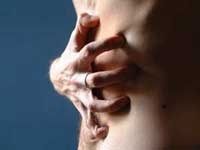Probiotic Compound Wards Off Visceral Pain Development in Irritable Bowel Syndrome
A high-potency probiotic supplement that mimics the effect of morphine in the gut may reduce the development of visceral pain in irritable bowel syndrome (IBS).

A high-potency probiotic supplement that mimics the effect of morphine in the gut may reduce the development of visceral pain in irritable bowel syndrome (IBS), according to results of a recent study published online in PLOS One on May 15, 2013.
For their “Probiotics VSL#3 Protect Against Development of Visceral Pain in Murine Model of Irritable Bowel Syndrome” study, Eleonora Distruttia, a gastroenterologist at the Regional Hospital of Perugia, in Italy, and researchers from the Department of Clinical and Experimental Medicine at the University of Perugia subjected five groups of male rats to the neonatal maternal separation (NMS) model — a stress experience that predisposes adult rats to visceral hyperalgesia, which mirrors the symptoms of IBS patients — for 60 days from birth.
A total of 20 rats in four of those NMS groups were treated orally with either placebo or VSL#3, a potent mixture of eight probiotic bacteria strains, from day three to day 60, while one group of five rats that were not separated from their mothers was used as the control. On postnatal day 60, all rats with the exception of two groups that were neither the control nor treated with placebo or VSL#3 were used in a series of colorectal distension (CRD) experiments, and the rats’ perception of pain induced by CRD was measured via abdominal withdrawal reflex scores.
At the conclusion of the tests, the researchers determined the probiotics VSL#3 intervention reversed the allodynia and hyperalgesia induced by CRD in the NMS rats without affecting colorectal compliance. At the genetic level, the authors found the expression of several genes in the colonic tissue specifically relating to pain and inflammation — including tryptophan hydroxylase 1 (TPH1), which plays a central role in IBS symptoms — was “upregulated in NMS hypersensitive rats and significantly downregulated in NMS animals treated with VSL#3 … indicating that a possible mechanism of action of the probiotic diet was the regulation of genes encoding for protein mediating painful signals.”
“These findings agree with previous observations indicating that probiotics induce the expression of delta-opioid and cannabinoid receptors in intestinal epithelial cells, mediating analgesic functions in the gut in a way that mirrors the effect of morphine,” the authors wrote. Taking all of their observations of VSL#3 into account, the authors concluded their “analysis of the mechanisms underlying the pathogenesis of pain in an experimental model of IBS … allowed the identification of novel regulatory mechanisms and specific patterns of genic expression caused by exposure to probiotic that might have clinical readouts in conditions of visceral pain and stress-correlated intestinal pathologies.”